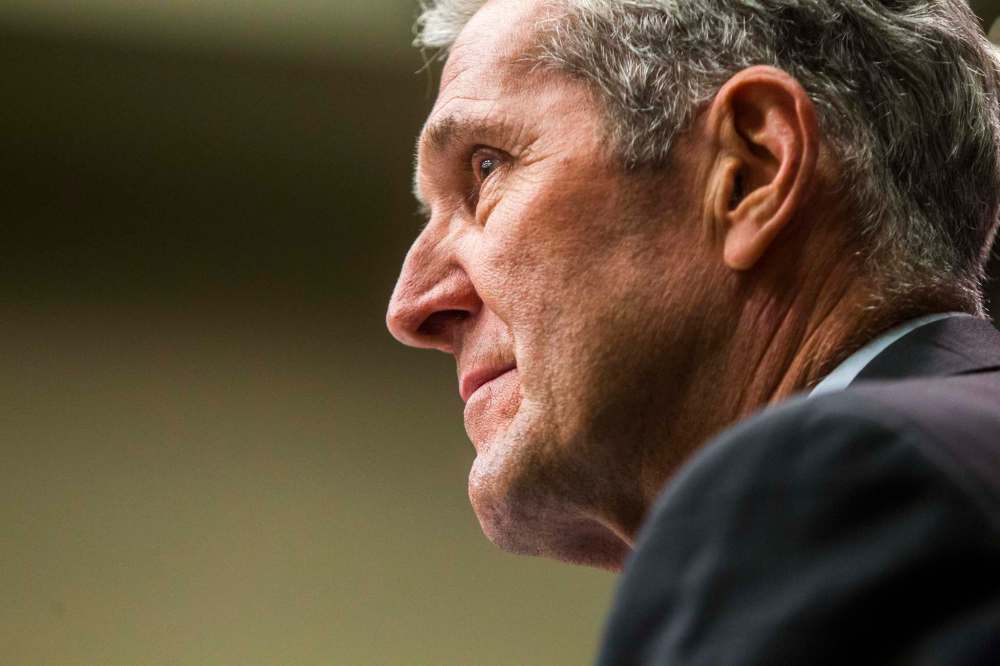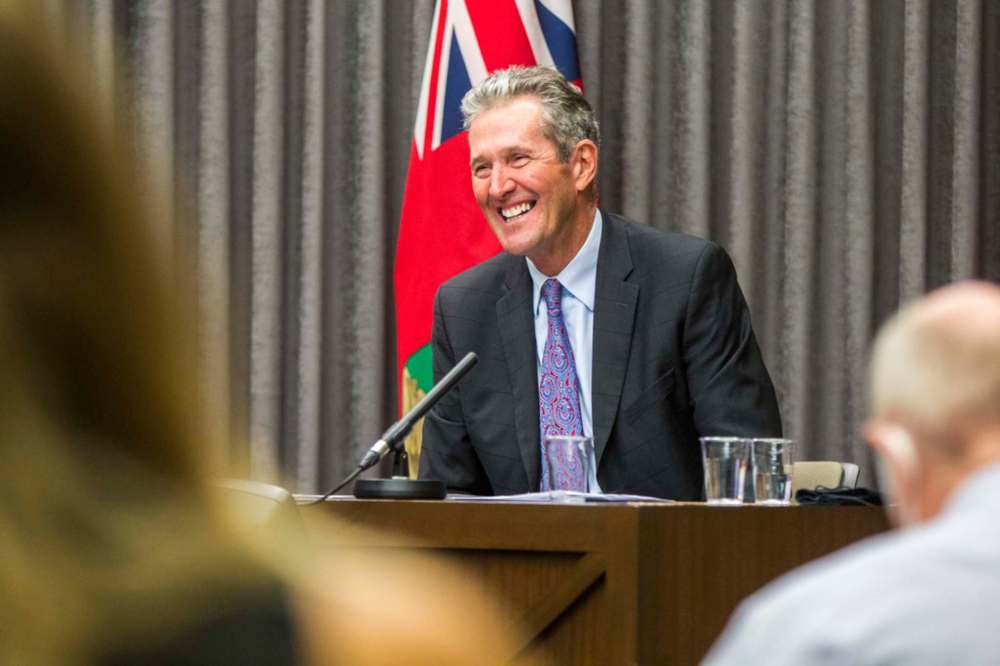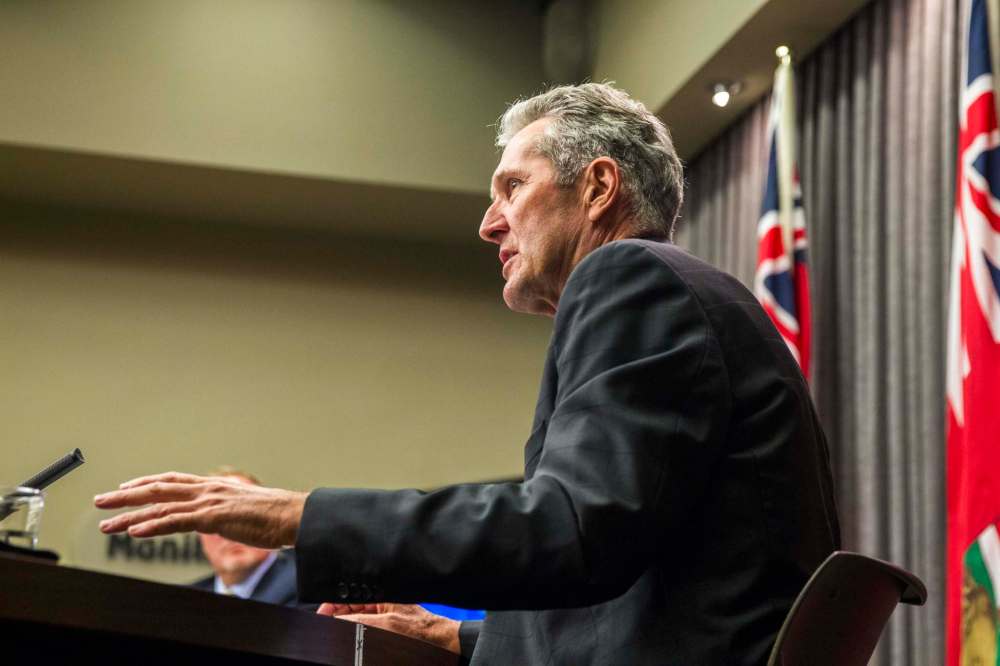Balanced-budget celebration fleeting Pallister government makes good on promise ahead of schedule, but expects pandemic-fuelled $3-B deficit will follow
Read this article for free:
or
Already have an account? Log in here »
To continue reading, please subscribe:
Monthly Digital Subscription
$0 for the first 4 weeks*
- Enjoy unlimited reading on winnipegfreepress.com
- Read the E-Edition, our digital replica newspaper
- Access News Break, our award-winning app
- Play interactive puzzles
*No charge for 4 weeks then price increases to the regular rate of $19.00 plus GST every four weeks. Offer available to new and qualified returning subscribers only. Cancel any time.
Monthly Digital Subscription
$4.75/week*
- Enjoy unlimited reading on winnipegfreepress.com
- Read the E-Edition, our digital replica newspaper
- Access News Break, our award-winning app
- Play interactive puzzles
*Billed as $19 plus GST every four weeks. Cancel any time.
To continue reading, please subscribe:
Add Free Press access to your Brandon Sun subscription for only an additional
$1 for the first 4 weeks*
*Your next subscription payment will increase by $1.00 and you will be charged $16.99 plus GST for four weeks. After four weeks, your payment will increase to $23.99 plus GST every four weeks.
Read unlimited articles for free today:
or
Already have an account? Log in here »
Hey there, time traveller!
This article was published 29/09/2020 (1894 days ago), so information in it may no longer be current.
Just as COVID-19 was hitting Manitoba last March, the province was poised to close the books on a balanced budget. Now, with the virus firmly entrenched, the government is facing a gargantuan shortfall that’s approaching $3 billion.
On Tuesday, the Progressive Conservative government released the audited financial statements for 2019-2020. They show a modest $5 million surplus for the year ended March 31 — a big improvement on the $360 million deficit the government predicted in its 2019 budget.
During last year’s provincial election campaign, Premier Brian Pallister promised to put the province’s books into the black by 2022. He got the job done ahead of that target by holding the line on departmental expenses and underspending budgeted amounts on infrastructure.

“Today’s announcement is a celebration of keeping our commitments. It’s a celebration of facing the challenges,” the premier said.
However, the government’s fiscal performance is about to take a sharp turn for the worse, according to the Finance Department’s estimates. The latest deficit estimate for the current fiscal year is $2.938 billion — compared with the estimated $220 million shortfall forecast in March.
Government revenues this year are expected to be $1.56 billion lower than budgeted as a result of the economic shutdown caused by COVID-19. Expenses are projected to exceed budgeted amounts by $1.158 billion due to the cost of fighting the virus and supporting Manitobans in its wake.
Pallister celebrates political goal

Posted:
Manitoba Premier Brian Pallister took time to celebrate accomplishing one of his major political goals Tuesday, while fending off questions about his future.
The government projects the province’s economic growth to fall by 5.2 per cent this year before rebounding by 4.8 per cent in 2021. It expects to take in $318 million less from individual income tax this year, $155 million less from corporate income tax, $62 million less in retail sales tax and $422 million less from other taxes.
“It’s not frustrating; it’s rewarding,” Pallister said about the fiscal turnabout after slaying the deficit, explaining the government worked hard to place Manitoba on a strong financial footing so it would be able to withstand an emergency such as the pandemic.
“Today’s announcement is a celebration of keeping our commitments. It’s a celebration of facing the challenges.” – Premier Brian Pallister
So far this year, it has spent $363 million on personal protective equipment alone, including $178 million on face shields and masks, $104 million on gowns and coveralls and $22 million on gloves and hand sanitizer.
According to the province’s latest projections, Health Department spending this year will climb to $7.27 billion from a budgeted $6.8 billion, an increase of $445 million.
As it has in the past, the office of the province’s auditor general disputed some of the Pallister government’s accounting practices.
Rather than a $5 million surplus for 2019-2020, as the government states, the true surplus is actually $43 million, according to a statement issued by newly appointed auditor general Tyson Shtykalo.
wfpsummary:Premier Brian Pallister hailed his government Tuesday for stopping a “runaway train” of deficits under its NDP predecessor but its path to get spending back on track has been ruthless, critics say.
To the average Manitoban, reports of a balanced 2019/20 budget with a modest surplus means little compared to what they lost, NDP Leader Wab Kinew said.:wfpsummary
Premier Brian Pallister hailed his government Tuesday for stopping a “runaway train” of deficits under its NDP predecessor but its path to get spending back on track has been ruthless, critics say.
To the average Manitoban, reports of a balanced 2019/20 budget with a modest surplus means little compared to what they lost, NDP Leader Wab Kinew said.
“The real world impact is that you can no longer go to the Victoria General emergency room, the Concordia emergency room, the Seven Oaks emergency room, the Roblin emergency room, the Altona emergency room during may hours and Ashern during many hours,” Kinew told reporters Tuesday.
A balanced budget during good times is a laudable goal but Kinew criticized how Pallister achieved it. He criticized a shortfall in infrastructure spending by more than $400 million from the $1.8 billion budgeted.
“One of the most effective ways that government can intervene in the economy is by investing in infrastructure,” he said. “Every school that doesn’t get built this year, every road that doesn’t get fixed is a road and a school that will need to be fixed by the next generation,” said Kinew.
“The runaway train of NDP deficits actually financed much needed infrastructure investments we’re all benefiting from, while his government has slashed spending,” Lynne Fernandez, an economist with the Canadian Centre for Policy Alternatives said of Pallister. She credited massive support from the federal government for helping Manitobans during the pandemic, not the provincial government for balancing its books and having $5 million leftover.
“Now that we’re in a second wave and more and more people need to be tested, a small government surplus isn’t going to help,” Fernandez said.
Pallister and Finance Minister Scott Fielding said Tuesday the province went into the pandemic on a stronger financial footing thanks to high levels of immigration and their fiscal stewardship that’s resulted in lower taxes, more investment and a stronger economy.
Liberal leader Dougald Lamont dismissed that, saying the province increased revenue by $19 million from the growing economy and that most of the money came from $354 million provided by the federal government and tens of millions in new fees the province is collecting from Manitobans – from service fees in health care to higher tuition fees and fees being clawed back from First Nations students.
“They’ve made Manitobans suffer unnecessarily,” said Lamont. Cutting taxes – including Pallister’s one per cent reduction in the PST – could have gone toward paying down the debt. “He could’ve balanced the budget must faster,” Lamont said.
The economist also questions the rationale for cutting taxes.
“I find it hard to understand how cutting taxes has decreased the deficit, because lower taxes means lower revenues, which, if you’re deficit adverse, has to lead to spending cuts,” Fernandez said. “…We’ve taken a close look at his tax cuts, and they’ve not benefitted low-income Manitobans who are the ones who spend all their disposable income, so he can’t claim that these cuts are stimulating the economy.
— Carol Sanders
The province and the AG have long disagreed whether the financial results of the Workers Compensation Board and the Manitoba Agricultural Services Corp. should be included in the province’s summary budget accounting. The auditor general says they should be included, the government says they should not.
It’s not the first time, the AG has given a “qualified opinion” on the PC government’s books. A year ago, then-auditor general Norm Ricard, citing similar disagreements, said if the government had properly employed public-sector accounting standards it would have shown a $9-million surplus in 2018-2019, rather than a deficit of $163 million.
Last fiscal year, government revenues were $616 million higher than budgeted, and expenses were $207 million higher than anticipated. Total strategic infrastructure spending in 2019-2020 amounted to $1.4 billion, $404 million less than budgeted. The underspending included $51 million on housing infrastructure and $74 million on health-care capital projects.
Total Health Department spending last year increased by $303 million to $6.8 billion compared with the year before.
larry.kusch@freepress.mb.ca


Our newsroom depends on a growing audience of readers to power our journalism. If you are not a paid reader, please consider becoming a subscriber.
Our newsroom depends on its audience of readers to power our journalism. Thank you for your support.






